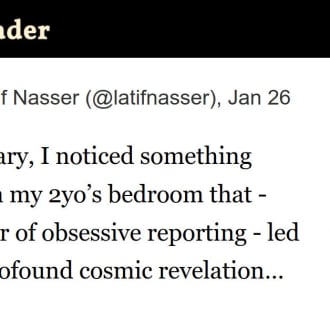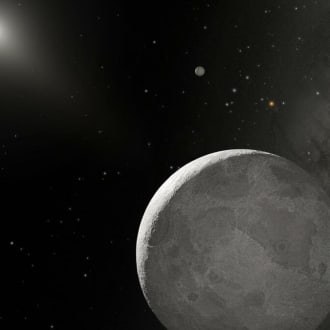
The Best Articles in Space
The most useful articles and videos in Space from around the web, curated by thought leaders and our community.
Refind focuses on timeless pieces and updates the list whenever new, must-read articles or videos are discovered.
Top 5 Space Articles
At a glance: these are the articles that have been most read, shared, and saved in Space by Refind users in 2024 so far.
Videos
Watch a video to get a quick overview.
Einstein's equations and the enigma of wormholes
Quantum wormholes are mathematically possible — but might also be physically impossible. Physicist Janna Levin explains the wormhole paradox.This interview i...
What does the entire Universe look like? ...using cereal
The scale of the Universe might seem too big to grasp, what does the Universe even look like? What do you picture when you hear that word? Galaxies? Stars? E...
MOON BASE - THE FIRST 10,000 DAYS (Timelapse)
The start of the Moon base begins with the Lunar Space Station going online. This is where Elon Musk's SpaceX Lunar Starship, the HLS (Human Landing System) ...
Can space mining alleviate shortages of key resources?
Recent developments suggest mining in space is gradually getting closer to becoming a reality, but could asteroids really help us to replenish resources on E...
Brian Cox on how black holes could unlock the mysteries of our universe
When black holes disappear, what happens to the stuff that fell in? Physicist Brian Cox explains.Subscribe to Big Think on YouTube ► https://www.youtube.com/...
What is ...?
New to Space? These articles make an excellent introduction.
What Is the Geometry of the Universe?
In our mind’s eye, the universe seems to go on forever. But using geometry we can explore a variety of three-dimensional shapes that offer alternatives to “ordinary” infinite space.
How to ...?
How to Make the Universe Think for Us
Physicists are building neural networks out of vibrations, voltages and lasers, arguing that the future of computing lies in exploiting the universe’s complex physical behaviors.
Trending
These links are currently making the rounds in Space on Refind.
Astronomers Watch in Real Time as Epic Supernova Potentially Births a Black Hole
Data from a recent stellar explosion showed a mathematical discrepancy, possibly providing rare evidence of a black hole forming right before our very eyes.
Could a telescope ever see the beginning of time? An astronomer explains
Now out in space for more than two years, the James Webb Space Telescope is a stunningly sophisticated instrument.
The Moon Likely Turned Itself Inside Out 4.2 Billion Years Ago
A pair of NASA spacecraft detected tiny variations in the Moon's gravitational pull, which may be the result of a dense layer sinking to the bottom.
Does light itself truly have an infinite lifetime?
One of the most enduring ideas in all the Universe is that everything that exists now will someday see its existence come to an end. The stars, galaxies, and even the black holes that occupy the space…
The consequences of traveling in a straight line forever
The Universe is a vast, wondrous, and strange place. From our perspective within it, we can see out for some 46 billion light-years in all directions. Everywhere we look, we see a Universe filled with…
Short Articles
Short on time? Check out these useful short articles in Space—all under 10 minutes.
We Finally Know What Turned The Lights on at The Dawn of Time
We finally know what brought light to the dark and formless void of the early Universe.
A profound cosmic revelation
@latifnasser: Last January, I noticed something peculiar in my 2yo’s bedroom that - after a year of obsessive reporting - led me to a profound cosmic revelation about what’s even possible in our…
Webb telescope makes unexpected find in outskirts of our solar system
These ice worlds aren't dead.
How Might Life Migrate Through the Universe?
Notes on interstellar hitchhikers and the origins of life.
What Did Hubble See on Your Birthday?
What did Hubble look at on your birthday? Enter the month and date below to find out! Then share the results with your friends on social media using #Hubble. Firefox users: To easily share your…
Long Articles
These are some of the most-read long-form articles in Space.
17 astounding scientific mysteries that researchers can’t yet solve
What is the universe made out of? How should we define death? Where did dogs come from? And more!
Extra-Long Blasts Challenge Our Theories of Cosmic Cataclysms
Astronomers thought they had solved the mystery of gamma-ray bursts. A few recent events suggest otherwise.
Ask Ethan: Could Earth be the only planet with intelligent life?
The Universe, as we understand it today, is a vast expanse of space littered with stars, galaxies, and very likely planets, for as far as our instruments can probe. Beyond that, there’s likely a much…
Warp drive's best hope dies, as antimatter falls down
Ever since we first looked up at the night sky and saw the glittering tapestry of distant stars, humanity has wondered about what else might be out there. As we learned more about the Universe, our…
A New Theory for the Assembly of Life in the Universe
If we want to understand complex constructions, such as ourselves, assembly theory says we must account for the entire history of how such entities came to be.
Thought Leaders
We monitor hundreds of thought leaders, influencers, and newsletters in Space, including:
What is Refind?
Every day Refind picks the most relevant links from around the web for you. Picking only a handful of links means focusing on what’s relevant and useful.
How does Refind curate?
It’s a mix of human and algorithmic curation, following a number of steps:
- We monitor 10k+ sources and 1k+ thought leaders on hundreds of topics—publications, blogs, news sites, newsletters, Substack, Medium, Twitter, etc.
- In addition, our users save links from around the web using our Save buttons and our extensions.
- Our algorithm processes 100k+ new links every day and uses external signals to find the most relevant ones, focusing on timeless pieces.
- Our community of active users gets the most relevant links every day, tailored to their interests. They provide feedback via implicit and explicit signals: open, read, listen, share, mark as read, read later, «More/less like this», etc.
- Our algorithm uses these internal signals to refine the selection.
- In addition, we have expert curators who manually curate niche topics.
The result: lists of the best and most useful articles on hundreds of topics.
How does Refind detect «timeless» pieces?
We focus on pieces with long shelf-lives—not news. We determine «timelessness» via a number of metrics, for example, the consumption pattern of links over time.
How many sources does Refind monitor?
We monitor 10k+ content sources on hundreds of topics—publications, blogs, news sites, newsletters, Substack, Medium, Twitter, etc.
Who are the thought leaders in Space?
We follow dozens of thought leaders in Space, including NASA, NASA History Office, Phys.org, Tim Urban, Chris Hadfield.
Missing a thought leader? Submit them here
Can I submit a link?
Indirectly, by using Refind and saving links from outside (e.g., via our extensions).
How can I report a problem?
When you’re logged-in, you can flag any link via the «More» (...) menu. You can also report problems via email to hello@refind.com
Who uses Refind?
450k+ smart people start their day with Refind. To learn something new. To get inspired. To move forward. Our apps have a 4.9/5 rating.
Is Refind free?
Yes, it’s free!
How can I sign up?
Head over to our homepage and sign up by email or with your Twitter or Google account.
Keep Learning
Get the big picture on your favorite topics.

















